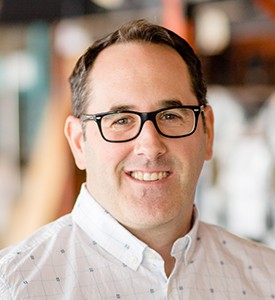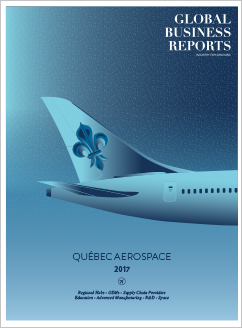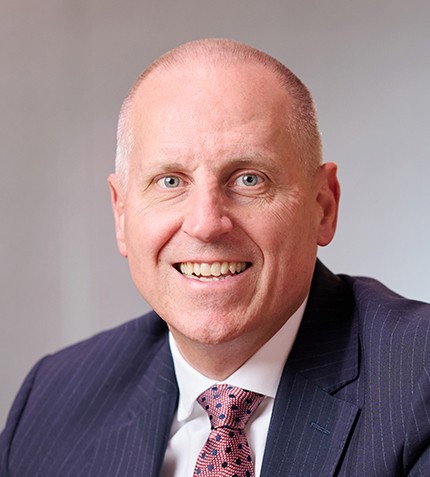
Luxia Innovation (Luxia) specializes in the provision and installation of carpet and other floor covering solutions for commercial and private aircraft.
RELATED PUBLICATION
ARTICLES FROM THIS PUBLICATION
- Interfacing with Industry: Québec’s Universities Fortify Aerospace Activity
- Driving Efficiency to Increase Competitiveness: Québec’s Service and Equipment Providers
- The Big Four and the Competitiveness of Québec’s Aerospace Supply Chain
- Banding Together: Québec’s Innovation Ecosystem
- Aerospace in Québec: The Case for an Industrial Policy
- A New Order: Québec’s Supply Chain Reaches Turning Point
- Québec’s Aerospace 4.0: A Solution to Cost Pressures?
- Quebéc Aerospace: Education
- Safety First
Francis Labonté & Eric Roberge
OWNERS, CEO & CFO, LUXIA INNOVATION
Could you provide a brief overview of Luxia’s history and main activities?
ER: Luxia, a company of 20 employees, has been in operation for 27 years and grew from a small business run by an artist producing carpets for commercial and residential buildings. In the 1990s, he was approached by Bombardier to work on the CRJ platform and over the years the company’s business with Bombardier grew. Francis and I purchased the company three years ago and made the decision to focus solely on aerospace. Luxia specializes in providing ready-to-install carpets for commercial and private aircraft. Its main strength lies in offering custom services to high end clients. More broadly, Luxia can produce all of the softer materials found inside a cabin such as carpets, maintenance runners, rugs and hard flooring.
How do the commercial and the private aircraft markets differ?
ER: The difference is like night and day. With regard to commercial aircraft, we simply receive drawings from our clients and make the necessary cuttings. Carpets are changed every three months but the requirements are quite simple. On the private side, we are always working with a different material from one plane to the next. The material is more expensive and the maintenance demands are higher.
How has the government helped Luxia grow?
FL: In 2016, the federal government provided Luxia with C$100,000 to invest mainly in 3D scanning technology. Because private aircraft owners usually do not have their own drawings of their aircraft, it can take about eight hours to create a template of business jets like the Bombardier Challenger 350. However, the 3D technology we have developed can create a digital template in about an hour. This greatly differentiates our company in the market. With the help of the government funding, we also updated our ERP system to replace the paper-based system the company had before.
The barriers to enter aerospace markets are high and the sales cycles are long. Export Québec has supported us by setting up meetings with companies at trade events such as NBAA and MRO Americas. Nothing concrete has come from this yet but we value the support and in the medium term it will help Luxia to export.
How successful has Luxia been in gaining certifications and approvals and how has this fueled growth?
FL: When we bought the company it had no certifications or approvals; however, we have worked hard to become AS9100 and ISO 9001 certified, as well as gaining registration on the Canadian Government’s Controlled Goods Program. Although Luxia already had a contract in place before having these certifications, they will give the company extra credibility to win more business. Luxia is trying to diversify its client portfolio and has recently won more commercial contracts. We are exporting more to the United States and we see opportunities there that will help us expand our business.
How competitive is the floor covering market?
ER: Our main competition comes from MRO companies or internal teams within our clients such as Bombardier. Two or three companies compete with us in North America on commercial aircraft. MRO companies are less skilled in handling carpets as they are mechanics rather than craftsmen; therefore, they cannot truly compete with Luxia on floor covering for private aircraft.
What recent trends have you noticed in the market?
FL: Hard flooring is becoming more popular in aircraft cabins because it is easier to clean. Recycling has also become a theme in the market. Luxia works closely with Air Canada and multiple research organizations to find solutions to recycle carpets, particularly to separate the different materials. Since October 2016, we have recycled 100% of the wool carpet that would go to waste owing to a process we have developed to turn it into compost. Commercial aircraft manufacturers are also working with carpet manufacturers to recycle carpets more efficiently.
What are Luxia’s key objectives in the next few years?
ER: The next step is to penetrate the U.S. market. Luxia works with all the major companies in Canada that would buy floor covering, such as Air Canada and Bombardier. However, there are many more private aircraft owners in the United States compared to Canada which presents a big opportunity. Luxia plans to capitalize on this opportunity either through opening a plant or through an acquisition. We are confident we are the best in the business, which means Luxia will continue to grow.











